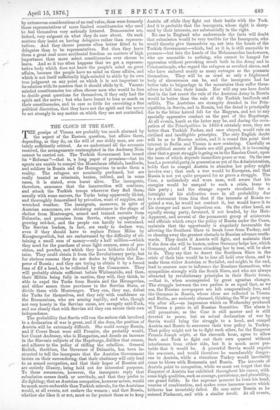THE CLOUD IN THE EAST.
T"gossips of Vienna are probably too much alarmed by the aspect of the Eastern question, but affairs there, depending, as they do, on the will of one sickly man, are cer- tainly sufficiently critical. As we understand all the accounts received, the arrangements contemplated in the Andrassy Note cannot be carried out. The Turkish Government has issued its " Reforms "—that is, a long paper of promises—but its agents are unable to compel the Mussulman officials, landlords, and soldiery in Bosnia and the Herzegovina to make them a reality. The refugees are nominally pardoned, but are really treated as criminals, beaten, robbed, and in some cases, it is stated, even burnt alive. The insurgents, therefore, announce that the insurrection will continue, and attack the Turkish troops wherever they find them, usually with some success, the TUrks being apparently ill-led, and thoroughly demoralised by privation, want of supplies, and wretched weather. The insurgents, moreover, in spite of Austrian annoyance, are obtaining assistance in the shape of shelter from Montenegrd, armed and trained recruits from Dalmatia, and promises from Servia, where sympathy is growing red-hot, and the people can hardly be restrained. The Servian leaders, in fact, are ready to declare war, even if they should have to replace Prince Milan by Karageorgewitch, but are embarrassed by the difficulty of ob- taining a small sum of money—only a half million—which they need for the purchase of some light cannon, arms of pre- cision, and powder, and which they have hitherto failed to raise. They could obtain it from the Revolutionary party, but for obvious reasons they do not desire to frighten the Em- peror of Russia ' • and they are trying to obtain it by a forced loan of £2 a head, to be collected by the Communes. They will probably obtain sufficient before Whitsuntide, and then, their Militia being fully in motion, they will, they think, be able to expel the Turks from Bosnia and the Herzegovina, and either annex those provinces to the Servian State, or divide them with Montenegro. They can, they say, defeat the Turks for themselves, and they rely with confidence on the Roumanians, who are arming rapidly, and who, though not very hearty in the Servian cause, are savagely anti-Turk, and see clearly that with Servian aid they can secure their own independence.
The probability that Servia will run the serious risk involved in a declaration of war is great, and if she does, the position of Austria will be extremely difficult. She could occupy Bosnia, and if Count Beast were still Premier, she probably would, but Count Andrassy, who is Hungarian, and dreads an increase in the Slavonic subjects of the Hapsburgs, dislikes that course, and adheres to the policy of stifling the rebellion. General Rodich, therefore, the Governor of Dalmatia, has been in- structed to tell the insurgents that the Austrian Government insists on their surrendering, that their obstinacy will only lead to an armed occupation, and that their hopes of Russian aid are entirely illusory, being held out for interested purposes. To these assurances, however, the insurgents reply that submission means death or servitude, and that they prefer to die fighting; that an Austrian occupation, however severe, would be much more endurable than Turkish misrule, for the Austrians would, at all events, not enslave the women ; and that Russia, whether she likes it or not, must so far protect them as to keep Austria off while they fight out their battle with the Turk. And it is probable that the insurgents, whose sight is sharp- ened by their interests, are substantially in the right.
No one in England who understands the facts will doubt that submission would be very terrible for the Insurgents, who would thereby give themselves up, not into the hands of the Turkish Government—which, bad as it is, is still amenable to pressure—but into the hands of the Mohammedan landowners, who are amenable to nothing, who cannot be hanged for oppression without provoking revolt both in the Army and in Constantinople, who regard the refugees as revolted slaves, and who have endured nearly as many outrages as the peasants themselves. They will be as cruel as only a frightened body of slaveowners can be, and the insurgents had far better take to brigandage in the mountains than suffer them- selves to fall into their hands. Nor will any one here doubt that in the last resort the rule of the Austrian Army in Bosnia would be better than the rule of the Turkish landlords and militia. The Austrians are strangely dreaded in the Prin- cipalities, in Servia, and in Bosnia, but the dread is principally due to the bitter hatred felt for the Magyars, and not to any specially oppressive conduct on the part of the Hapsburgs. At all events, harsh as the latter may be, and during the occu- pation of the Principalities in 1853-4 certainly were, they are better than Turkish Pashas, and once obeyed, would rule on civilised and intelligible principles. The only English doubt will be as to Russian action, and it is round this point that interest in Berlin and Vienna is now centering. Carefully as the political secrets of Russia are still guarded, it is becoming clear that a great struggle is going on in the Russian Court, upon the issue of which depends immediate peace or war. On the one hand, a powerful party, in possession as yet of the Administration, holds that to compel Austria to abandon her policy might involve war ; that such a war would be European, and that Russia is not yet quite prepared for so grave a struggle. The Czar, a melancholy and worn man, well aware that his energies would be unequal to such a crisis, leans to this party ; and the strange reports circulated for a fortnight of his abdication were in all probability due to a statement from him that if the interests of Russia re- quired a war, he would not conduct it, but would leave it to his stronger and more imperious son. On the other hand, an equally strong party, favoured, if not headed, by the Heir- Apparent, and several of the permanent group of aristocrats and officials which sways the policy of Russia under the Czars, maintain that the opportunity is singularly favourable for allowing the Southern Slays to break loose from Turkey, and so clearing away the greatest obstacle to Russian advance south- wards. They doubt if Austria will fight, and maintain that if she does she will be beaten, unless Germany helps her, which Germany, afraid of France attacking her in rear, will be slow to do. They say that to desert the Southern Slays in the crisis of their fate would be to lose all hold over them, and to make them either Austrian or Socialist, and might, in the end, lead to courses sure to influence the Russians themselves, who sympathise strongly with the South Slays, and who are always attracted by revolutionary principles in their Slavic forms, —that is, when accompanied by great agrarian changes. The struggle between the two parties is so equal that, as we see, the Russian newspapers are left comparatively free, and the Germans in Russia, whose ideas are reflected in Vienna and Berlin, are seriously alarmed, thinking the War party may win after all,—an impression which on Wednesday produced at Vienna a panic in all Russian Securities. The alarm is still premature, as the Czar is still master and is still devoted to peace, but an actual declaration of war by Servia would bring the struggle to a head, and compel Austria and Russia to announce their true policy in Turkey. That policy might not be to fight each other, for the Emperor Francis Joseph might, at the eleventh hour, agree to allow Serb and Turk to fight out their own quarrel without interference from either side, but it is much more pro- bable that it would be. A powerful Servia would require the sea-coast, and would therefore be unendurably danger- ous to Austria, while a victorious Turkey would inevitably come to blows with Roumania and Russia. The interests of Austria point to occupation, while we must not forget that the Emperor of Austria has exhibited throughout his career, with some high qualities such as courage, persistency, and placability, one grand foible. In the supreme Moment he loses his head, wearies of combination, and makes some immense move which hitherto has invariably failed. He may enter Bosnia as he entered Piedmont, and with a similar result. At all events, it may be taken as certain that a most powerful party in Russia is encouraging Servia to declare war, and that if Servia declares war, which she must do before the end of May or not at all, a dreadful European struggle can be averted only by the painful moderation of a Sovereign who hitherto has displayed many considerable qualities, but never that one. The danger so greatly feared in Vienna may pass away, but it undoubtedly exists, and deserves the most sedulous attention.



































 Previous page
Previous page